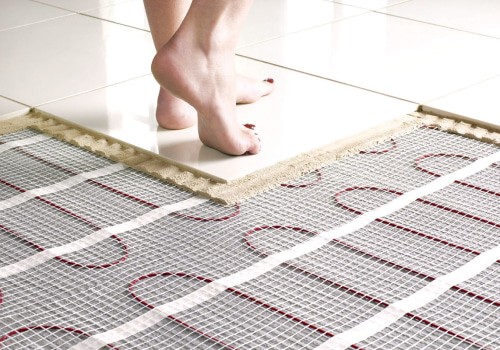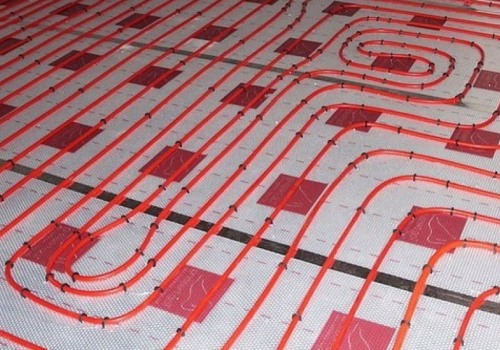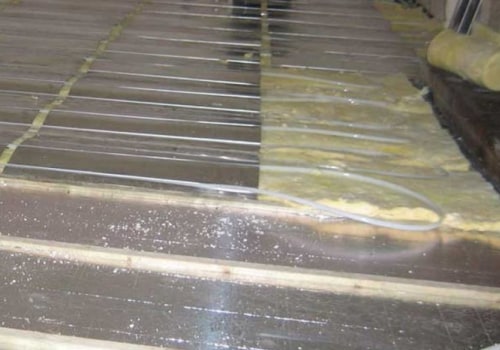Underfloor heating is a modern, energy-efficient heating system that is quickly becoming a popular choice for homeowners seeking more comfortable, consistent warmth. Unlike traditional heating methods, such as radiators or forced-air systems, underfloor heating works by warming the floor of a room, which then radiates heat evenly throughout the space.
One of the key benefits of underfloor heating is its energy efficiency. Traditional heating systems, especially forced-air units, tend to lose a significant amount of heat through ducts and vents, leading to higher energy consumption. In contrast, underfloor heating minimizes heat loss because it radiates warmth directly from the floor, warming the entire room evenly. This ensures that less energy is used to achieve the desired temperature, resulting in lower energy bills and a more sustainable way to heat your home.
The Role Of Solar Panel Installation In Heating Your Home
Solar panel installation plays a significant role in transforming how homeowners heat their homes, especially when paired with underfloor heating systems. By capturing and converting sunlight into electricity, solar panels provide a renewable and sustainable energy source that can be used to power various home systems, including underfloor heating. In Tennessee, where sunlight is abundant throughout much of the year, solar panels offer a fantastic opportunity to reduce reliance on conventional energy sources, lower utility bills, and make your heating system more eco-friendly. Instead of relying on electricity from the grid, which is often generated from fossil fuels, you can harness the sun's power to efficiently heat your home through underfloor heating.
Underfloor heating systems, whether electric or hydronic, require a steady supply of energy to function. When solar panel installation is integrated into the system, it allows homeowners to use the energy generated by their panels to power these systems. For electric underfloor heating, the solar power generated by the panels can directly feed into the system, warming the floors without using grid electricity. Hydronic systems, which rely on circulating warm water through pipes beneath the floor, can also benefit from solar energy. The electricity generated from solar panels can power the pump and other components necessary for the system to circulate the water, thus reducing the home's overall reliance on external power sources.
By integrating solar panel installation with underfloor heating, like those offered by Rocky Top Solar, homeowners in Tennessee can take advantage of the state's sunny climate, where solar energy production can be maximized. With an efficient solar system in place, energy costs for heating can be drastically reduced, especially in the cooler months when heating demands tend to increase. Solar panels can provide enough energy to cover the electricity needs of your underfloor heating system and any excess energy can be stored for later use or even sold back to the grid, further improving the system's overall efficiency. This means that during peak sunlight hours, your home can be powered by clean, renewable energy, ensuring that your underfloor heating remains cost-effective and sustainable.
How Solar Panels Can Power Your Underfloor Heating System
For electric underfloor heating, the process is relatively simple. Solar panels generate direct current (DC) electricity, which is then converted into alternating current (AC) by an inverter, making it compatible with household appliances, including the electric underfloor heating system. The electricity generated from the solar panels can be used to directly power the heating cables or mats that are embedded in the floors, providing a cost-effective and environmentally friendly heating solution. This method not only reduces the reliance on grid power but also allows homeowners to take advantage of free electricity from the sun, lowering their energy bills and reducing their carbon footprint.
For hydronic underfloor heating systems, which use warm water circulating through pipes beneath the floor, solar panels can still play a vital role in providing energy. While solar panels do not directly heat the water, they can power the pump and other components of the system. These pumps circulate the heated water throughout the underfloor pipes, ensuring an even distribution of warmth. Solar energy can also be used to power additional equipment like valves and controllers, allowing the system to run efficiently. By relying on solar power to operate the components of a hydronic system, homeowners can ensure that their underfloor heating runs on renewable energy, making the entire setup more sustainable.
Integrating solar panel installation with underfloor heating helps Tennessee homeowners reduce their dependence on conventional energy sources while more effectively managing energy expenses. With Tennessee's favorable climate for solar energy, installing solar panels to power underfloor heating can lead to significant savings on monthly electricity bills. As energy costs continue to rise, many homeowners are seeking ways to reduce their heating expenses, and using solar energy to operate an underfloor heating system provides an excellent solution. Once the system is set up, the ongoing maintenance and operational costs for both the solar panels and the underfloor heating are minimal, making it a smart and long-term investment. For a seamless installation experience, it's essential to work with a reliable solar panel installation contractor who can ensure everything runs efficiently and cost-effectively.
Sizing Your Solar Panel Installation For Maximum Efficiency
The first step in sizing your solar panel system is calculating how much energy your underfloor heating system will require. Electric underfloor heating systems typically consume more energy because they directly convert electricity into heat, so understanding the wattage needed for the system to operate effectively is essential. For hydronic systems, which use warm water circulated through pipes, the energy consumption depends on the pump and any associated components, such as valves and controllers. By adding up the total wattage of these components, you can estimate the power needed to run your underfloor heating system and ensure that your solar panels will meet these demands.
Next, consider your home's energy usage beyond just underfloor heating. While your goal is to harness solar power for heating, your solar panel installation should account for all electricity consumption in the household. This includes lighting, appliances, and any other devices that rely on electricity. By determining your home's total energy needs, you can size the solar panel system appropriately, ensuring it can handle both your heating requirements and the overall electricity consumption. This is particularly important if you plan to rely heavily on solar power for most of your energy needs, as it will help you avoid overloading your system and ensure it operates efficiently throughout the year.
The amount of sunlight Tennessee receives plays a significant role in determining the ideal size for your solar panel installation. The state experiences an average of 200 sunny days per year, making it well-suited for solar energy production. However, the intensity of sunlight varies throughout the year, with longer, sunnier days during the summer months and shorter days in the winter. To ensure your solar panels are properly sized, it's important to account for these seasonal changes in sunlight. A professional installer can help you estimate the average amount of solar energy your panels will generate based on your location, ensuring that the system is designed to meet your heating and electrical needs year-round.
Contact A Solar Energy Company In Tennessee
If you're considering harnessing Tennessee's abundant sunshine for underfloor heating with solar panel installation, it's essential to contact a reputable solar energy company to help guide you through the process. A professional solar energy provider can assess your home's energy needs, design a customized solar solution, and handle the entire installation from start to finish. By working with an experienced company, you can ensure that your system is appropriately sized, efficiently installed, and optimized for maximum performance.
One such company that stands out in Tennessee is Rocky Top Solar. With years of experience in the solar energy industry, Rocky Top Solar is dedicated to helping homeowners transition to cleaner, more sustainable energy solutions. Whether you're interested in powering your underfloor heating system or looking to reduce your overall energy consumption, their team of experts can help you choose the right solar panel system for your needs. They offer comprehensive services, from initial consultations and site assessments to system design and professional installation, ensuring that every step of the process is handled with care and expertise.
Choosing a local solar provider like Rocky Top Solar has its advantages, particularly in understanding the unique energy needs and climate conditions in Tennessee. Their team can evaluate your property to determine the optimal placement and orientation for your solar panels, ensuring maximum energy production. With their knowledge of local regulations and incentive programs, they can also help you navigate available tax credits and rebates, making the entire process more affordable and efficient. By partnering with a trusted company like Rocky Top Solar, you can feel confident that your solar panel system will be both cost-effective and reliable, providing you with the benefits of renewable energy for years to come.











